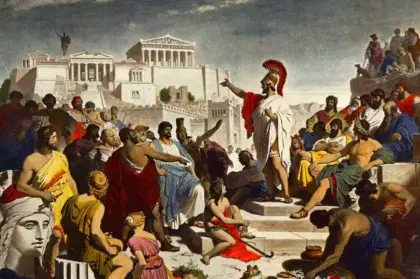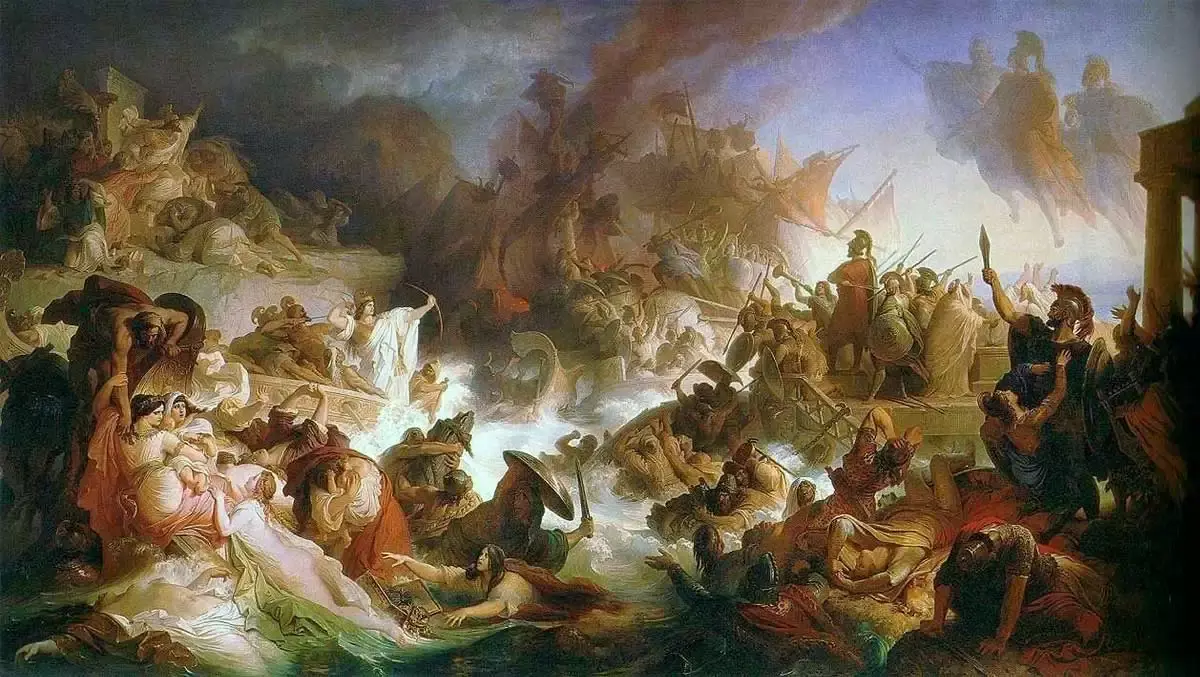Every so often, the freedoms enjoyed by people, which soon become out-of-sight and taken for granted, must be defended once again. That means not only awakening the general population to the delicateness of the whole social edifice that sustains their freedoms; it also requires from individuals a new-found interest in political philosophy and a knowledge of the long stretches of time and effort that have been required to achieve the jigsaw of liberties that sustain the liberal democratic way of life.
In the ancient world, these moments also arrived. At the end of the first year of the Peloponnesian War in around 430 BCE, Greek statesman Pericles felt driven to remind the crowds gathered in front of him of what it was that Athens stood for. He wanted to capture the essential principles behind the titanic struggle between the liberty-loving (at least by ancient standards) Delian League led by Athens and the more militaristic alliance led by those conformist-loving Spartans. His speech is remarkable for its modern sound.
JOIN US ON TELEGRAM
Follow our coverage of the war on the @Kyivpost_official.
Pericles implored his listeners to consider their constitution as one to be admired by others, not merely a pale copy of someone else’s. He spoke of equality before the law as a fundamental cornerstone of the Athenian constitution: “When it is a question of settling private disputes, everyone is equal before the law…We are free and tolerant in our private lives, but in public affairs we keep to the law. That is because it commands our deep respect,” he observed.
In the modern age, the First and Second World Wars were new maelstroms of conflict during which the public were awakened from the slumber of freedoms enjoyed but assumed as indefinite.
The view that the democratic way of life will forever remain unperturbed is not helped by our education systems. I will not claim to speak for other countries, but I can say that as a person educated in Britain, very few of us are taught at school about the origin of the rights and liberties we enjoy.
There is a cursory mention of the Magna Carta in history lessons, but no deeper sustained discussion on how the ideas of freedom of expression and equality before the law, for example, came to exist and the considerable courage and sacrifice of life that was required over centuries to achieve a society in which the simple act of criticizing leaders in public was acceptable.
Personally, I only began to read the political philosophy of Aristotle, Locke, Hobbes, and others, in my thirties – and that was only because I was thinking about freedom on the Moon.
This New Year 2023, we find ourselves again at a defining moment in human history. There is no shortage of enemies of the liberal democratic order from all sides. From the East, we have been woken from our sleepiness by a violent shaking of tanks rolling across the plains of Ukraine.
In the West, there is also danger. The left wing, in pursuing well-intentioned critiques of the colonial past and in attempting to shore up rights, have, in my view, become so consumed with specifics that they have developed a deep animus against western society in general that does an injustice, and shows an ingratitude, to the hard-won liberties achieved over centuries.
But on the right-wing, in some quarters there has developed a shabby contempt for the febrile institutions of the democratic order. Elections are casually challenged, and the finely tuned checks and balances of long-established arrangements are treated as inconvenient driftwood to be cast aside to clear the political path. The importance of honour, probity, and virtue in public affairs is treated with disdain by all sides.
It seems that in setting up opposing camps across an ideological divide, we have forgotten the common foundation that allows us to express these differing views of the world in the first place. In fighting for the success of our own version of democracy, we risk destroying the entire structure.
The antagonists of the democratic order, whether from within or without, sometimes claim that democracy is a weak and brittle thing. They are right. The carefully crafted and honed balances of such societies are fragile and must be treated like a rare antique: difficult if not impossible to replace once destroyed, tender and prone to damage if handled roughly, and deserving of respect and a healthy reverence.
Freedom is not a cudgel to be brandished against your political opponent. A rivalry between ideas must occur with a gentle forbearance and as a contest that respects the wider institutional arena of a free state.
Another criticism often levelled at the so-called liberal democratic order is that it is ill-defined and wishy-washy. No democracy is like another we are told, so it is all relative. After all, there are countries that claim to be democratic, but have some egregious laws, whilst other so-called dictatorships have some institutions that the West might envy.
As we contemplate the beginning of 2023 and Ukraine’s struggle, what exactly do the defenders of liberal democracy believe? Is it just so much propaganda?
My answer is the latter question is no. Those of us who believe in liberal democracy do not believe that a utopia is ever achievable. The West has ailments and historical injustices. But we do believe in a set of ideas that we think lead to one of the best forms of flourishing and peace yet achieved by humans.
They include freedom of conscience, freedom of expression in the written and spoken word, and a freedom to assemble with other people to achieve what we want. To make these things a reality, a non-arbitrary, impartial, and uncorrupted legal system that ensures equality before the law and the right to be heard and presumed innocent until a crime has been proved are also essential facets of the overall design.
All these aspirations require a deep love of the institutional arrangements that protect them. That means a government whose core law-making activity is subject to consent by the people, in other words election of the key law- and decision-makers in government by democratic means. Crucially, it means a credible political opposition and not the façade of competition. Indeed, a true depth of democratic maturity is achieved when political groups actively encourage their own opposition and do not seek to repress them.
This is perhaps one of democracy’s greatest demands. One might even say it is the defining test of whether the institutional environment, and the people who comprise those institutions, have achieved a successful democratic system.
A belief in liberal democracy also means a defence of free economic activity, i.e., capitalism. Political and economic liberty are conjoined twins. An economic order managed entirely by the state will inevitably collapse into centralizing political oversight as the state seeks to control the apparatus of the economy and the people within it. Complete economic central planning is utterly incompatible with political freedom, no matter how much socialists might like to convince you otherwise.
On the flip side, the defence of free economies does not imply that states cannot take it upon themselves to do certain things, such as build hospitals or look after the environment, with agreement from the people. Liberal democratic orders do not require untrammelled libertarian economics. Hence, we arrive at the sort of mixed economies characteristic of most democracies today.
So, this is the vision of a free state. It is always open to improvement, but in its essential character it represents a state of affairs worth fighting for because it is, quite simply, the essence of freedom.
As 2023 unfolds, we should never take the effort and fortitude needed to achieve such societies for granted. Let us freshly resolve once more to defend these ideas.
I will leave the final say on these matters to Pericles, who concluded his oration with these prophetic words:
“Make up your minds that happiness depends on being free, and freedom depends on being courageous. Let there be no relaxation in face of the perils of war.”
Pericles’s exhortation is old news to Ukrainians, but it is a test for the whole world in 2023.
Charles Cockell is Professor of Astrobiology at the University of Edinburgh.
You can also highlight the text and press Ctrl + Enter





